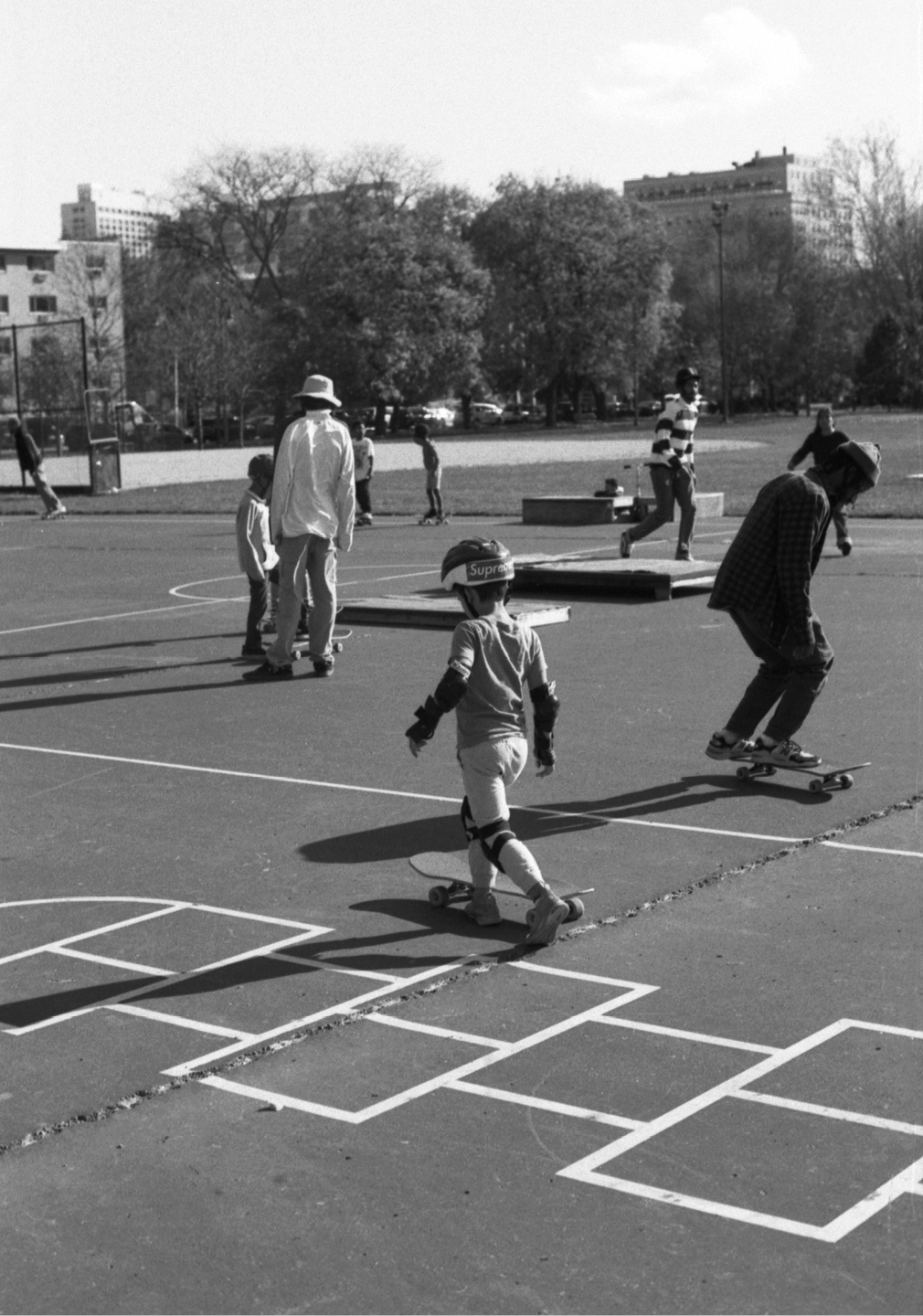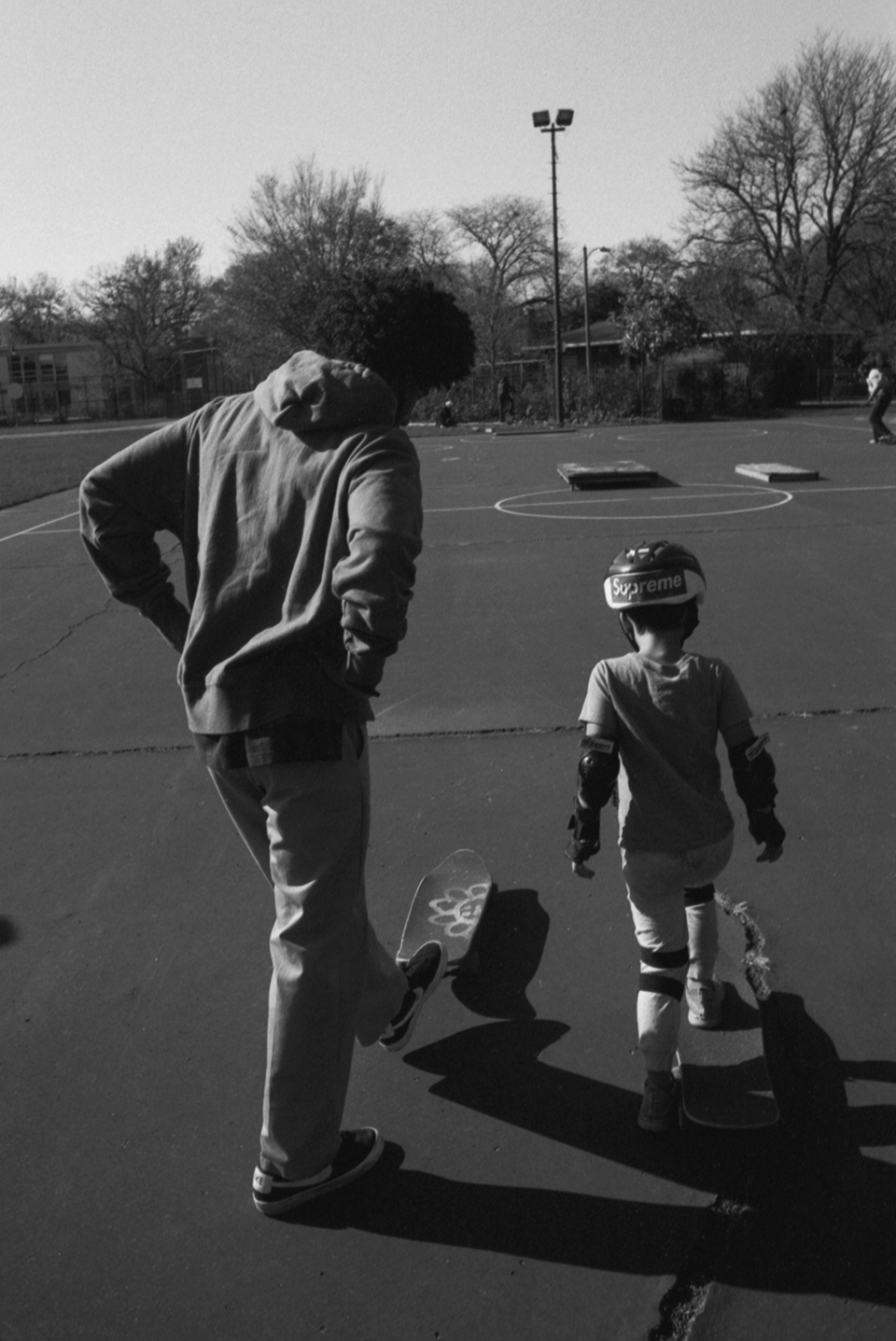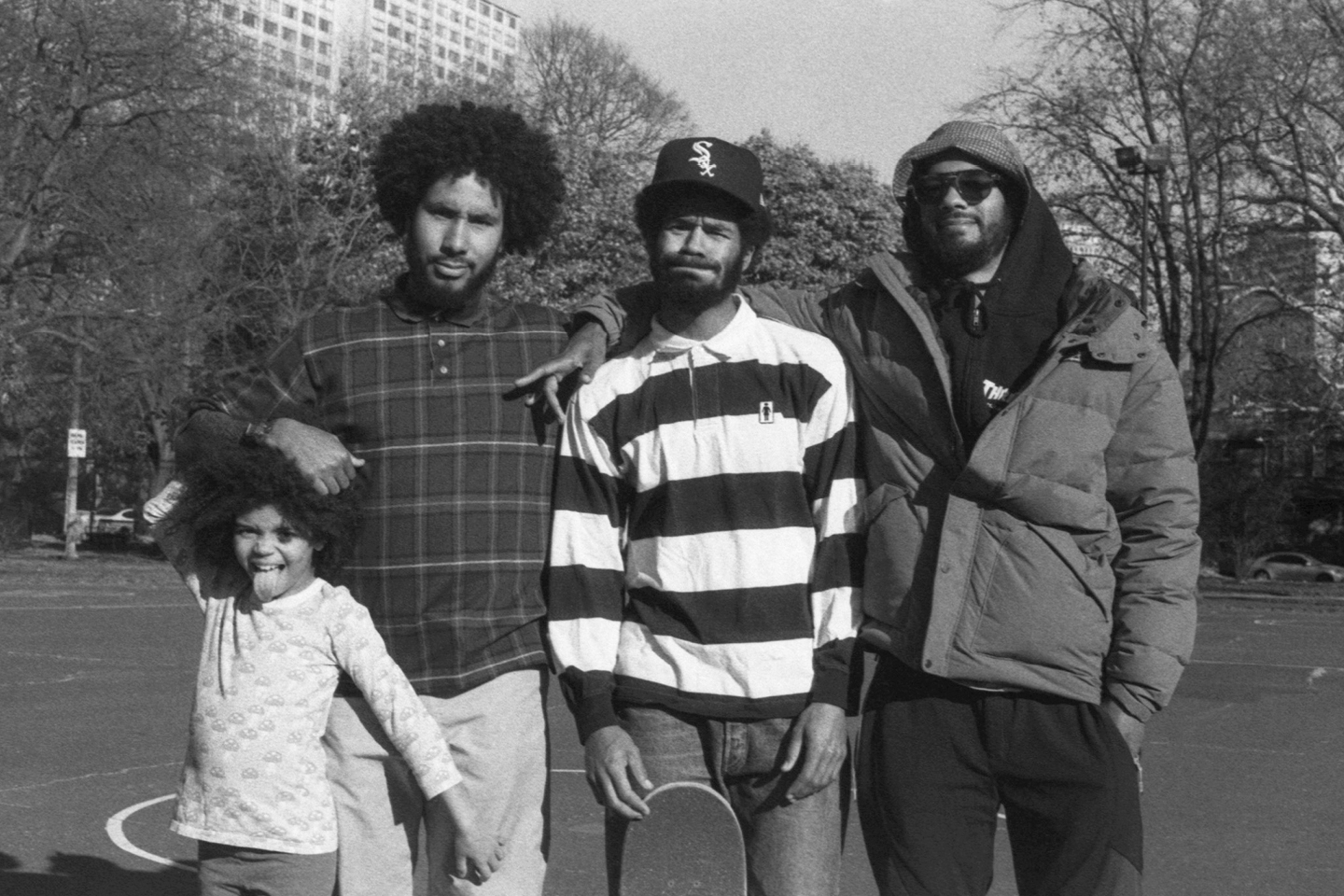Interview Conducted by The EditorsPhotography by Danny Klein
Katon Black on Natty Bwoy: Building Community in Seclusion
![]()
This past fall we visited Kenwood on the Southside of Chicago to attend a Natty Bwoy skate school session. Each Sunday, as long as the sun is shining, brothers Katon, Kari, and Kahari Blackburn operate skateboarding lessons within the community. It’s a modest operation, but what it lacks in resources it makes up for with momentum. With the number of guests growing despite the organization starting at such an isolating time, it demonstrates what can be done with charisma. It also speaks to how people respond to it. And though Chicago does invest in communities, whether or not you feel it depends entirely on geography. Still, neglect does leave a fervorous opening for grassroots efforts. So, curious about how it all started, we decided to speak with Katon about Natty Bwoy and how he feels about Chicago Skateboarding.
Editors: You mentioned having an opportunity to open up a shop in Boxville, but what exactly is that?
Katon: Boxville is this little consumer marketplace in Bronzeville for young entrepreneurs trying to start a business or just wanting to engage with the community. They have a plot of land with a bundle of shipping containers we rent out which becomes our small businesses
And is it privately owned or does the city fund it at all?
It’s privately owned by a black owned company called Urban Juncture. A man named Bernard Loyd founded it.
Had you been thinking about opening a business before hearing about Boxville or had the opportunity sparked an interest spontaneously.
Well, to give you a timeframe: This was two years ago after I just moved back to Chicago from L.A during the start of the pan- demic. I had a lot of time on my hands—not working or going to school or anything. Towards the end of the summer our friend blurted out, “dang, if you guys owned a bike shop you could have made a bunch of money this summer,” because there were record breaking sales. That triggered the idea. We talked to our Mom about it—she already knew about Boxville and was actually friends with Bernard so that really helped with submitting a proposal. To our benefit, they previously had a box that would do bike repairs, but it was inactive. So we proposed opening our own and incorporating skateboarding stuff.


Do you carry any specific brands or is it less of a curation?
Honestly, we mostly run on donations. We give out decks to kids who are interested in skating, but can’t afford a whole new setup. For a brief moment, we opened up an account with NHS to get grip, a few boards, and some cheap trucks. We had enough stuff to build a brand new complete. Of course, anyone with as much experience as you and I wouldn’t find anything they were looking for, but someone just starting out would be able to leave without spending like $230.
Yeah of course. Someone figuring it out is way less picky. So you’re working out of a shipping container—setting up ‘Frankenstein’ boards. When exactly did you decide to start hosting skate lessons?
Boxville is what started the movement. We were working solely out of the space for a while, but kept pondering on how we could alert people on the South Side that there was a resource for those interested in skateboarding. One day I went to our neighborhood courts and realized, “Wow, everyday it seems like I’m meeting new skaters.” One of which is my friend Nori. When I mentioned to him that I was thinking about running lessons he was super down to help because he was new to skating himself and wanted to be involved. So he’s been a part of it since the beginning.
Once parents found out, did the number of students quickly pick up?
Definitely. When we started maybe like five kids would come out, then slowly, within a month, it was 20. I think Instagram was the catalyst spreading the word amongst the South Side. Then the word really got around after The Hyde Park Herald did an article on us. We also started it during the Pandemic. At that time people were very receptive because there wasn’t a lot going on—there wasn’t a lot of engagement for kids.


Did the parents treat you like a teacher?
Kinda, sorta. Sometimes they’d treat me like a friend. Some- times they’d treat me like a neighbor. Sometimes they’d treat me like someone who’s just supposed to look after their kid for a few hours. But I will say, for the most part, my interactions with parents have been positive. They’re always excited to help, and bring water and snacks for everyone.
What’s your approach to teaching kids how to skate? I have two little cousins just starting out and when we go to the park I’m not sure if they are listening to me or even want advice.
Man. That’s my favorite thing. Sometimes people say it’s hard to teach kids—and I’m sure in a structured form it’s more difficult—but skate lessons, the way I do them, are unstructured. It makes it pretty fluid. It would be harder if I had to teach grown people or even teenagers. I feel like kids are trying to do their own thing—they don’t need much. The most would be if there’s a kid who wants to talk to me—thinks I’m really cool—and keeps chatting. Most of the kids get hooked on whatever they’re working on. I’ll give them tips, but they’re usually in their zone having fun.


Do you think Chicago is a skate-friendly place? You mentioned that you lived in L.A, which has no shortage of skaters or shit for them to skate, but we all know Chicago is very different. Like would kids be able to go out and street skate on their own or is it better to have a designated area for everyone to learn?
The first thing I’ll say is that one of the things I was excited about after curating the courts was the fact that it created a new community of skaters in Hyde Park. I think that’s really cool because it wasn’t there before. I’m not saying there weren’t any skaters prior, but there is a new community now. But to answer your question: I don’t think Chicago is that skate-friendly a place. I think the city could go harder on some of the—
I think we need more parks.
Yes, we definitely need more parks! Where they put them would have to be strategic. If you put a skatepark in a certain part of the city it might not get used that much, but who’s to say, I guess. Maybe that will create the scene and by not even building the park we’d prevent the chance of one forming.
I think you’ve proved that already. Like if you get people together, it’s infectious. And as far as parks go, I know New York has around 32 and we have four. Of course New York is bigger than Chicago, but it’s not 8 times bigger.
Yeah, it’s crazy. Growing up on the South Side, the only park I ever knew was 31st Street and that park sucks. Everyone on the South Side shouldn’t have to go all the way up to downtown—there should be other things here for us skaters. My friend Tariyawn, who grew up on the North-West side, said the closest park to him was Wilson and that’s all the way by the lake. There needs to be more for a lot of people in this city.
Imagine if there were more resources for people trying to get into skating. If I was introduced even younger than I was I’d be even more comfortable with it. There were times where I didn’t feel accepted or could even be a part of skateboarding. We should create more opportunities for communities to be exposed to the wonders and creativity of skateboarding. I think that’s what Natty Bwoy has been all about.


